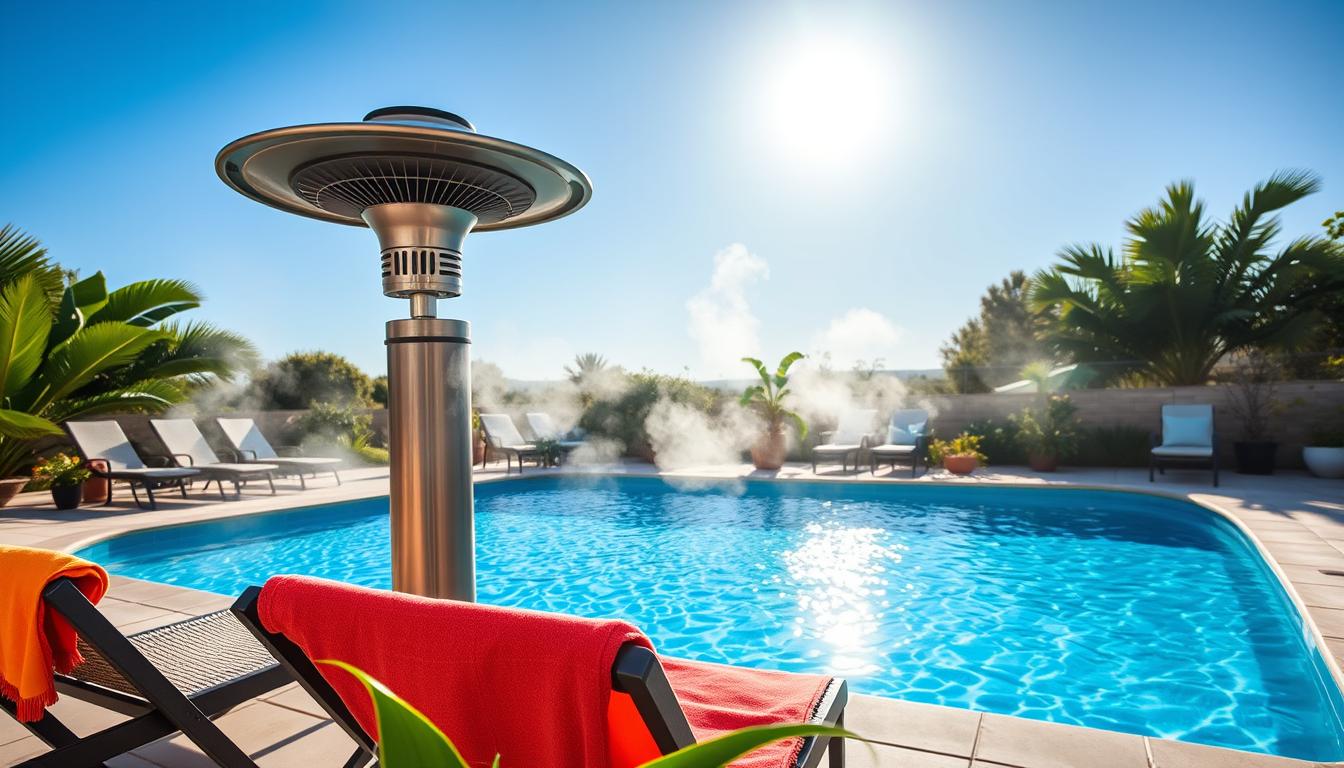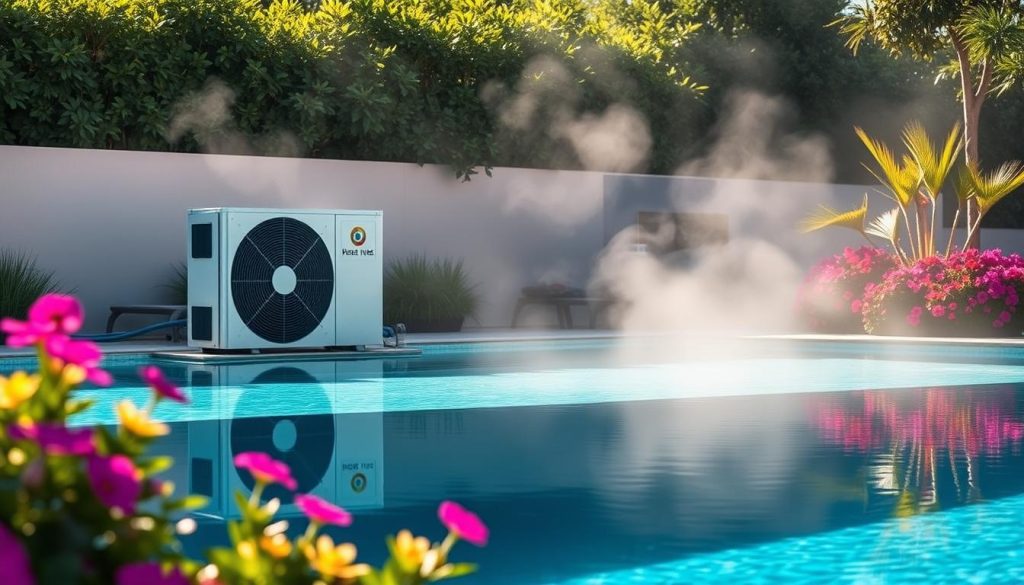
Pool owners eagerly await the perfect moment to dive into their backyard oasis. But the excitement can fade when the pool’s temperature isn’t ideal. Understanding pool heating time is crucial for maintaining optimal temperature control.
Several factors influence how long it takes to heat a pool. These include pool size, heating system type, and starting water temperature. Environmental conditions in your area also play a role.
Heating time can range from 8 to 48 hours or more. This wide range depends on various factors affecting pool heater efficiency. Knowing these variables helps you manage your pool’s heating process better.
We’ll explore the factors that impact pool heating time. You’ll gain valuable insights on how long it takes for a pool to heat up. This information will help you optimize your pool’s heating system for comfortable swimming.
Factors That Affect Pool Heating Time
Several key factors determine how long it takes to heat your pool. Understanding these variables helps you plan and make smart choices about your pool heating system. This knowledge can save you time and money on heating costs.
Pool Size and Volume
The size and volume of your pool affect heating time. Larger pools need more energy and time to warm up. A 20,000-gallon pool takes longer to heat than a 10,000-gallon one.
Starting Water Temperature
The initial water temperature impacts heating duration. A bigger gap between current and desired temperature means longer heating time. Using a pool cover helps maintain water temperature, reducing heating time and energy use.
Heater Type and Efficiency
Your heater type and efficiency are crucial for pool heating time. Common heater types include gas, electric heat pumps, and solar heaters. Each has its pros and cons in terms of speed and cost.
- Gas heaters: Propane or natural gas heaters are known for their quick heating capabilities, but they may have higher operating costs.
- Electric heat pumps: These heaters are more energy-efficient and have lower operating costs, but they may take longer to heat the pool compared to gas heaters.
- Solar heaters: Solar heating systems rely on sunlight to warm the pool water, making them eco-friendly and cost-effective, but they may require longer heating times and are dependent on weather conditions.
The heater’s BTU rating also affects heating speed. Higher BTU ratings usually result in faster heating times.
Weather Conditions and Climate
Local weather and climate greatly influence pool heating time. Air temperature, wind speed, and sunlight amount affect how quickly your pool heats up. Cooler climates or cold weather slow down heating, while warm temperatures and sunlight speed it up.
Strong winds can increase heat loss, making the heating process slower. Consider these factors when planning your pool heating schedule.
| Factor | Impact on Pool Heating Time |
|---|---|
| Larger pool size | Increases heating time |
| Higher starting water temperature | Decreases heating time |
| Gas heaters | Faster heating time, higher operating costs |
| Electric heat pumps | Slower heating time, lower operating costs |
| Solar heaters | Longer heating time, dependent on sunlight |
| Cooler weather and strong winds | Increases heating time |
| Warmer weather and ample sunlight | Decreases heating time |
Consider these factors when choosing your pool heating system. This will help you optimize heating time and reduce costs. Smart decisions lead to a more efficient and enjoyable pool experience.
Average Heat-Up Times for Different Pool Heaters
Pool heaters come in three main types: gas, electric heat pumps, and solar. Each type heats pools differently. Understanding their performance helps you choose the right one for your needs.

Gas Heaters
Gas pool heaters use natural gas or propane for quick heating. They work well in any weather. Gas heaters can warm pools faster than other types.
Here’s how long it takes gas heaters to warm pools:
• 50°F start: 18-36 hours
• 55°F start: 16-32 hours
• 60°F start: 14-28 hours
• 65°F start: 12-24 hours
• 70°F start: 10-20 hours
• 75°F start: 8-16 hours
Electric Heat Pumps
Electric heat pumps take heat from the air and transfer it to the pool. They’re slower than gas heaters but maintain temperature better. Cool weather can affect their performance.
Here’s how long it takes heat pumps to warm pools:
• 50°F start: 36-48 hours
• 55°F start: 32-44 hours
• 60°F start: 28-40 hours
• 65°F start: 24-36 hours
• 70°F start: 20-32 hours
• 75°F start: 16-24 hours
| Pool Size | Required Heat Pump Power |
|---|---|
| 30-40m³ | Minimum 9 kW |
| 40-60m³ | Minimum 12 kW |
| 50-80m³ | Minimum 16 kW |
Solar Heaters
Solar pool heaters are eco-friendly and cost-effective. They use solar collectors to warm pool water. Their effectiveness depends on sunlight availability.
Here’s how long it takes solar heaters to warm pools:
• 50°F start: 48-72 hours
• 55°F start: 44-68 hours
• 60°F start: 40-60 hours
• 65°F start: 36-52 hours
• 70°F start: 32-48 hours
• 75°F start: 24-36 hours
Small pools (10,000 gallons) in sunny regions can experience a temperature increase of 10-15°F within 1-2 days with an efficient solar heating system, while larger pools (20,000 gallons) may take 2-4 days in similar conditions to achieve the same temperature rise.
Pool size, starting water temperature, and weather affect heating time. Consider these factors when choosing a pool heater. This info will help you pick the best heater for your pool.
How Long Does It Take for a Pool to Heat Up?
Pool heating time depends on size, starting temperature, heater type, and weather. It typically takes 8 to 48 hours to reach the desired temperature. Gas heaters are fastest, while solar heaters take longest.
Larger pools need more time to heat due to increased water volume. Small pools may take 24-72 hours, medium pools 48-96 hours, and large pools 72-120 hours. Using a pool cover can reduce heat loss by up to 70%.
Starting water temperature affects heating time. From 50°F, gas heaters take 18-36 hours, electric heat pumps 36-48 hours, and solar heaters 48-72 hours. Higher starting temperatures reduce heating time. Proper insulation helps maintain water temperature.
Choosing the right heater is crucial for efficiency. Gas heaters heat quickly, while electric heat pumps maintain temperature better. Heat pumps can be 600% efficient, saving up to 80% on costs compared to gas heaters.
Solar heaters are eco-friendly but may need longer run times. Regular maintenance, like monthly filter cleaning, improves heat pump performance and longevity.







